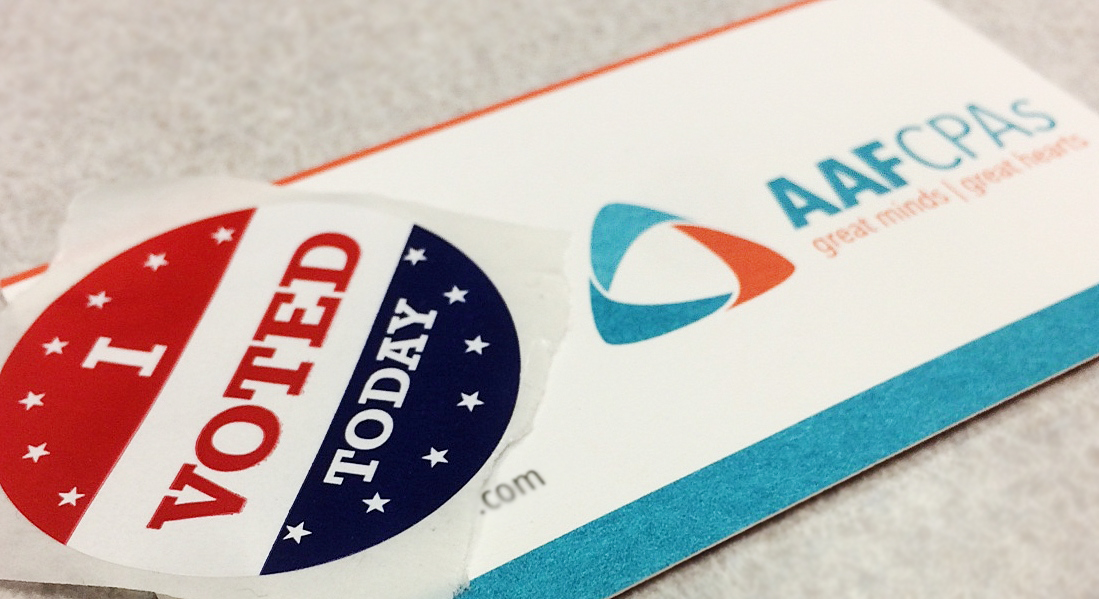How Will the Election Impact Your Taxes?
As the 2016 US Presidential Election approaches, AAFCPAs’ Richard Weiner shares his viewpoints on the short and long-term tax impact Clinton or Trump presidency may have, as well as an analysis of how Republican’s and Democrat’s respective tax plans may impact clients.
How quickly will the new President impact you personally or professionally?
 The composition of Congress, especially the House of Representatives, has much more impact than does the incoming President in terms of trying to forecast the direction of future tax legislation.
The composition of Congress, especially the House of Representatives, has much more impact than does the incoming President in terms of trying to forecast the direction of future tax legislation.- The tax legislation passed late in 2015 (Protecting Americans From Tax Hikes Act of 2015 (“PATH”)) extended a number of provisions through 2019. I wouldn’t anticipate a big desire for change, because business owners and individual taxpayers alike prefer certainty and consistency so they are able to enhance long term planning and decision making. In other words, The House is unlikely to propose any significant changes in the near future.
- The incoming President’s agenda may carry some weight, but due to the negativity of the campaign, I suspect that there will not be any substantive action in the first 100 days, otherwise known as the ‘honeymoon period.’ Historically, during the honeymoon period, the newly elected President and Congress look to pass legislation that they are in agreement upon prior to approaching issues likely to cause congressional gridlock. It is to be determined whether we’ll see this type of initial cooperation that we’ve seen in the past.
- An incoming president can have unilateral influence in the areas of enforcement and regulatory guidance. The Treasury Department, under direction of the Secretary, can pursue certain rulings, interpretations, or court actions on issues that the President deems important.
How may Trump or Clinton impact your tax planning?
Clinton’s Tax Plan (source: Hillary Clinton fact sheet)
- 4% surcharge on incomes over $5 million
- Eliminate the “step up” in basis of inherited property
- Limit retirement plan accumulations to an unspecified maximum
- Close “loopholes” including Bermuda reinsurance companies
- Eliminate “carried interest” rules
- Plan focuses more on wealthy individuals than on business enterprises
- Although Mrs. Clinton’s fact sheet discusses the promise to “restore fairness”, it does not contain specific proposals to simplify the tax system or provide relief to the middle class.
Trump’s Tax Plan (source: Donald Trump fact sheet)
- Reduction of business tax rate from 35% to 15%, including 10% preferential tax rate on repatriation of overseas profits
- Ability for businesses, via permanent election, to elect immediate expensing of all property purchases, in exchange for losing the right to deduct interest expense
- For individuals, reduction in number of tax rates from seven to three, with a maximum rate of 33%
- Expansion of standard deduction from $12,600 to $30,000 on a joint tax return. Itemized deductions will also be capped at $200,000 for joint filers
- Numerous expansions of childcare tax benefits
- Repeal of individual and corporate Alternative Minimum Tax
(Note to Reader: The above highlights are taken directly from each candidate’s respective web sites and, accordingly, are designed to appeal to their parties’ voter bases. They should be read in that context, with a reminder that passage of any tax proposals requires Congressional action.)
No matter what side of the debate you are on, AAFCPAs has your best interest at heart. We understand that every tax situation is unique and requires a careful and comprehensive plan. We communicate regularly and openly with our clients to ensure a full understanding of all strategic options available, including tactical guidance on how election results may impact short and long-term tax planning.
For further information, please contact your AAFCPAs’ partner or Richard Weiner at 774.512.4078, rweiner@nullaafcpa.com.

